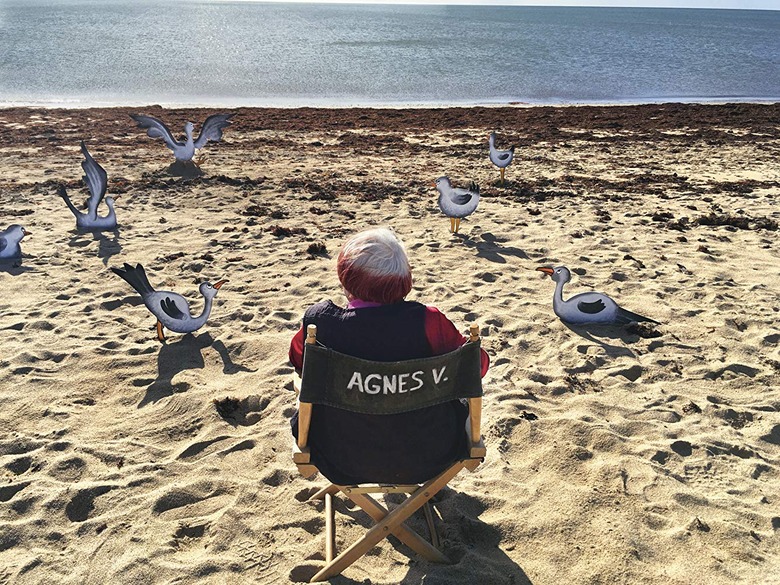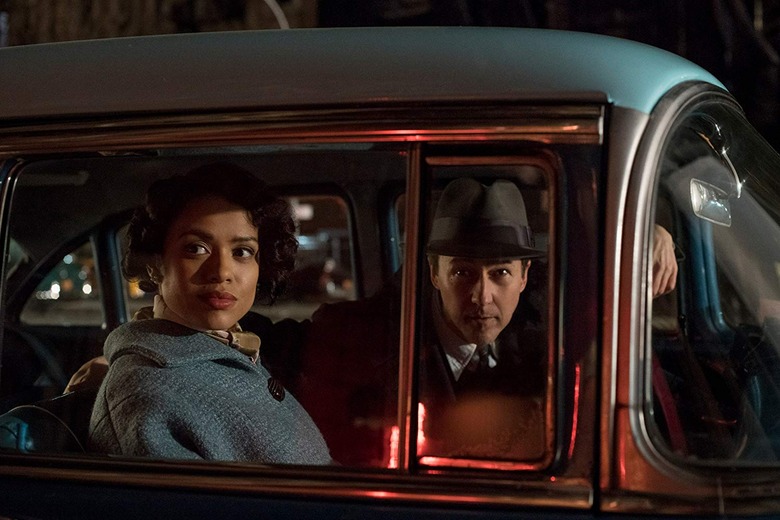New York Film Festival 2019 Week 2 Recap: 'Varda By Agnes,' 'Saturday Fiction,' 'Motherless Brooklyn'
The 57th annual New York Film Festival started off strong, with Martin Scorsese's interrogation of time in his mob masterpiece The Irishman. So it is perhaps rather fitting that the whirlwind two weeks of prestige films will end with a movie displaced out of time. Edward Norton's noir passion project Motherless Brooklyn was a somewhat baffling capper to this year's New York Film Festival, which was filled with its share of hits and misses. One of those misses is the impenetrable Lou Ye black-and-white romance drama Saturday Fiction. But a few of the gems were unmissable, including Agnes Varda's final film Varda by Agnes.
Dive into our New York Film Festival 2019 Week 2 recap.
Varda By Agnes
Time is relative, legendary French filmmaker Agnes Varda tells us with a knowing twinkle in her eye at the beginning of Varda by Agnes. And in her final and most quintessential film, she proves exactly how by taking us by the hand like some kind of diminutive fairy guardian and guiding us through her astonishing career. Structured around a lecture that the filmmaker gave to a group of bushy-tailed students in a French opera house, Varda by Agnes at first seems like a glorified TED Talk, with Varda giving a chronological rundown of her entire IMDB page. But the documentary soon begins to unfold, in typical Varda fashion, into an funny and intensely personal portrait of her life narrated and dissected by the one and only filmmaker.
As Varda launches into a discussion about her career, which began with the 1962 French New Wave classic Cleo from 5 to 7, time begins to bend around the filmmaker as she cuts to on-location shots where she explains how she pulled off the tracking shots from Vagabond (complete with Varda narrating from atop the dolly track), or wanders the beach that was at the heart of her bittersweet ode to aging and ephemerality in The Beaches of Agnes. But unlike some of her later documentaries, Varda by Agnes' purpose is not to reflect but to celebrate. In traveling through her own life and discussing her relation to art, on celluloid and in a gallery, Varda reminds us once again of the joie de vivre which she infused in even her darkest and most bitter films.
Partly like attending an intimate class lecture with the filmmaker, and partly like a tour through her life and career, Varda by Agnes is an illuminating and slightly surreal retrospective of the legendary French director's life's work, told with the impish, wry humor that she was known for. Endlessly chattering and always keen on getting the last word, it's no wonder that Varda wanted to get the last word in on her own life in this posthumous documentary — but never was there a eulogy so joyful, so funny, so effervescent as Varda by Agnes.
/Film Rating: 9 out of 10
Saturday Fiction
In a black-and-white drama set to the backdrop of a politically turbulent period of time, a doomed couple chart their tragic love story across the decades. But enough about Cold War. Saturday Fiction, Lou Ye's World War II-set Chinese drama starring Gong Li as a famous actress who reconnects with an old flame amidst an incomprehensible political plot, shares only surface-level similarities with Pawe? Pawlikowski's achingly beautiful 2018 romance. Despite the film's gorgeous black-and-white cinematography and intriguingly amorphous border between reality and fantasy, Saturday Fiction is an impenetrable slog.
The first 20 minutes play as if one is caught in a dream: Tan Na (Mark Chao) is directing his actors in rehearsal for a play based off his own brief affair with beloved actress Jean Yu (Li), who has returned to Shanghai ostensibly to star opposite her former lover. They meet in a crowded cafe onstage, but the camera soon plays a magic trick on us, panning to where the empty theater would be, only to show a wall — we have been transported back to Tan and Jean's actual meeting. The play, aptly called Saturday Fiction, appears several more times through the film to pull off this same sleight-of-hand and further blur our perceptions of reality — a brilliant gimmick that serves to break up the long minutes of dead space in between.
Jean has made a highly publicized return to "The Island of Rain," but her motivations remain a mystery: Is she really there to only star in her ex-lover's play about their lives, or is she there to free her ex-husband from a Japanese prison? The political intrigue serves as a fascinating backdrop to the unrequited romance between Tan and Jean, but it soon becomes clear that the intrigue is not a backdrop but the main plot, culminating in a bloody, magnificent third-act shootout that injects a bolt of lightning into the sluggishly ponderous film. It's too bad that Saturday Fiction is so wrapped up in its own enigma that this plot is completely indecipherable until those final moments.
/Film Rating: 5 out of 10
Motherless Brooklyn
You know that string of fake movies that play in a montage in Tropic Thunder? Motherless Brooklyn may be one of those films. Edward Norton's long-gestating passion project is his bid to make his Chinatown, right down to the 1974 noir classic's most potent plot twists and socially relevant gentrification narrative. But Norton's adaptation of the Jonathan Lethem novel, which takes the story of a detective with Tourette's in 1999 Brooklyn and transposes it to the 1950s, can't help feeling like a pale imitation of the great noirs it desperately tries to imitate.
Motherless Brooklyn stars Norton as Lionel Essrog, a private investigator with Tourette's whose mentor (Bruce Willis) is suddenly killed while working a case. Obsessed with finding the reason for his murder, Lionel retraces his mentor's steps and discovers an intricate web of corruption and deceit that goes all the way to the top...of the New York Housing Authority. At the center of this conspiracy is the Gugu Mbatha-Raw's passionate activist Laura Rose, who is leading a protest against the construction of a highway that would destroy the minority neighborhoods in Brooklyn. As Lionel gets closer to Laura, he is dogged by cartoonishly scary goons and the wealthy, all-powerful builder Moses Randolph (Alec Baldwin, about one degree removed from his Trump impression). Norton gives a confident performance as Lionel, whose Tourette's straddles the line between comedic and dramatic, aided by his assured, if obvious direction.Motherless Brooklyn really wants you to know it's a noir — just listen to those melancholic jazz trumpet solos on the score! Just see the shadows cast on the empty streets of Brooklyn as Lionel stumbles back from a brutal beating! There's no denying the style with which Norton directs Motherless Brooklyn, nor the engaging performances he gets out of his talented cast, which includes a delightfully unhinged turn from Willem Dafoe. But Motherless Brooklyn operates in a strange space — steeped in nostalgia but eager to tell an incredibly relevant and timely story. I couldn't tell you why Motherless Brooklyn is set in the 1950s, if not just for the aesthetic of it all. Though Norton once again proves that he is an eminently talented actor and director, Motherless Brooklyn is undeniably, indulgently a pet project — as if he built an entire set and story so he could play dress up in a noir./Film Rating: 6.5 out of 10



